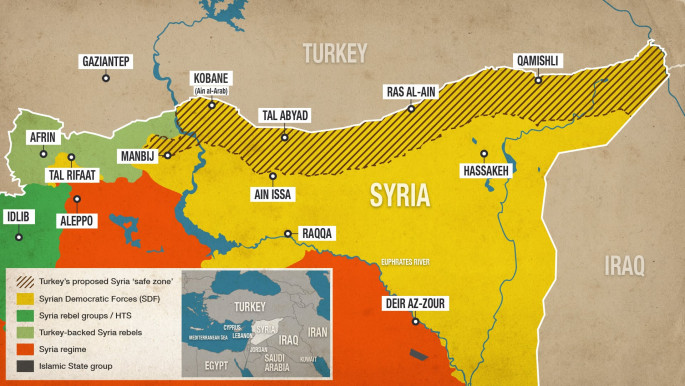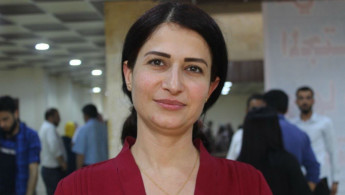Kurdish party leader Hevrin Khalaf 'killed in ambush' in northern Syria
A senior Kurdish politician and party leader was killed during an intense Turkish military offensive against Kurdish fighters in Syria, local news reported on Saturday.
Hevrin Khalaf, the secretary-general of the Future Syria Party, was reportedly killed during an ambush by Turkish-backed Syrian rebels during an attempt to capture a point on the international M4 road, Kurdistan 24 reported.
“With utmost grievance and sadness, the Syria Future Party mourns the martyrdom of engineer Havrin Khalaf, the General Secretary of Syria Future Party, while she was performing her patriotic and political duties,” the Future Party said in a statement.
Khalaf was reportedly killed on the road to the city of Qamishli, reports added.
“A group of Turkish mercenaries tried to control the M4 road and killed many people, and Hevrin was one of them,” a senior official told Kurdistan 24, in reference to Turkey-backed fighters.
Another official from the Future Party in Ain Issa claimed Khalaf was traveling from the Jazeera canton to Ain Issa and then to Raqqa before the Turkey-backed Syrian rebels blocked the way and carried out the ambush.
However, the Syrian rebels denied responsibility for the ambush.
The Kurdish-led Syrian Democratic Forces echoed the accusation in a statement later on Saturday. However, in a sign of confusion left by the Turkish operation, Turkey-backed Syrian rebels denied responsibility amid unconfirmed reports Islamic State-linked cells may be behind the ambush.
Asked by Reuters agency about the accusation that Turkey-backed groups had killed Khalaf, the spokesman for the Turkey-backed National Army, which groups Syrian rebel factions, said they had not made it as far as the highway known as the M4.
"I confirm to you that our forces have not reached the M4," Youssef Hammoud said in a voice message to Reuters, saying that they had instead reached a road closer to the border.
Khalaf previously voiced concern over the Turkish military operation.
The Turkish attempt "to occupy this land in order to defend the Turkish people don’t adjust to reality," she said during a press conference in the city of Qamishli on Oct. 5.
On Saturday, Turkey’s Anadolu Agency reported Turkey-backed Syrian opposition forces took control of the M4 highway that connects the towns of Manbij and Qamishli, where Khalaf was killed.
Read more: Islamic State group strikes Kurds amid intense Turkish offensive in Syria
News of Khalaf’s killing came amid reports suggesting Turkish forces seized control of the key border town of Ras al-Ayn, where fighting with Syrian Kurdish forces continued.
The Britain-based Syrian Observatory for Human Rights, an opposition war monitor, confirmed that Turkish troops have entered the town, adding that fighting is still ongoing.
Turkish troops also cut the route linking the northeastern city of Hassakeh with Aleppo, Syria's largest city and once commercial centre, according to the Syrian Observatory for Human Rights.
Growing casualties
 |
Since Wednesday, Turkish troops and their Syrian opposition allies have been advancing under the cover of airstrikes and artillery shelling, reaching the Manbij-Qamishli road about 30 kilometres (19 miles) south of the Turkish border.
The UN estimates the number of displaced at 100,000 since Wednesday, saying that markets, schools and clinics are also closed. Aid agencies have warned of a humanitarian crisis, with nearly a half-million people at risk in northeastern Syria.
A civilian wounded in a mortar strike from Syria the previous day in the Turkish border town of Suruc died, Anadolu also reported on Saturday, bringing the civilian death toll to 18 in Turkey.
Mounting criticism
France's leader warned Trump in a phone call that Turkey's military action in northern Syria could lead to a resurgence of Islamic State activity.
President Emmanuel Macron "reiterated the need to make the Turkish offensive stop immediately," his office said in a statement on Saturday.
On Friday, the Pentagon blasted Turkey for its three-day old assault, warning of "serious consequences" for its actions. The Trump administration also threatened sanctions on key Turkish officials over the matter.
The Netherlands and Norway, both NATO allies of Turkey, have suspended arms sales to Turkey over its latest offensive.
Turkish President Recep Tayyip Erdogan, however, has insisted the operation won't stop until the Syrian Kurdish forces withdraw below a 32 kilometre (20 miles) deep line from the border.
Ankara has said it aims to push back the Syrian Kurdish People's Protection Units, or YPG, which it considers terrorists for its links to a decades-long Kurdish insurgency within its own borders. The YPG is a main component of the Kurdish-led Syrian Democratic Forces.
Update: This article has been amended to include accusation by the SDF and denial by Turkey-backed National army of responsibility for Ms. Khalaf's killing, as well as stylistic improvements.
Follow us on Twitter: @The_NewArab





 Follow the Middle East's top stories in English at The New Arab on Google News
Follow the Middle East's top stories in English at The New Arab on Google News


